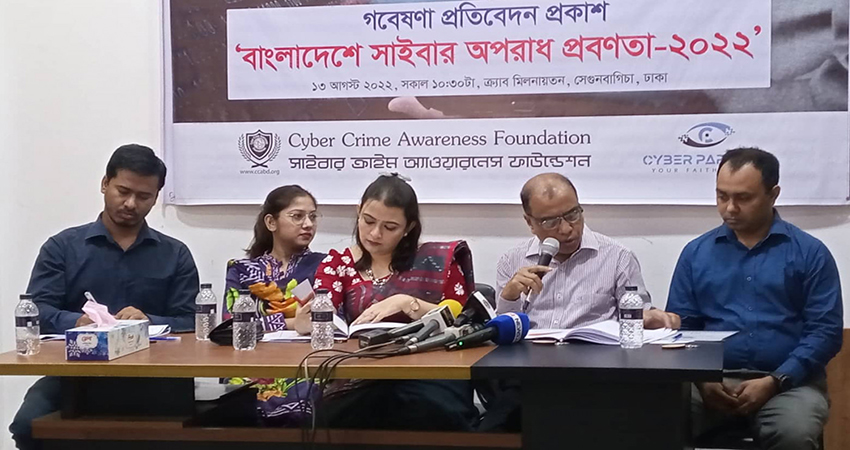Around 55.27% of victims of cyber crime do not get the desired outcome after reporting to the law enforcement agencies in Bangladesh, according to a study published by the Cybercrime Awareness Foundation on Saturday (13 August).
Senior Lecturer Monira Nazneem Jahan of the law department of East West University presented the details of the study titled "Cyber Crime Trend in Bangladesh-2022" at a programme at the Bangladesh Crime Reporters Association Auditorium at Segunbagicha in Dhaka.
Kazi Mustafiz, president of the Cybercrime Awareness Foundation, presided over the programme.
According to the report, only 7.4% of those who complained received a positive outcome in 2022.
As per the 2021 report, 22.22% of the total number of victims received an expected outcome after reporting to the law enforcement agencies, which is 15.18% higher than the 2022 figure.
The report was prepared based on a survey in which about 18 questions were asked to 199 victims from 15 February 2021 to 2 March 2022.
The survey showed that only 53 victims reported problems to law enforcement agencies this year, which is 26.6% of the total number of victims. However, it is 5.17% higher than the previous year.
The number of female complainants is comparatively lower than that of male complainants.
Among female victims, only 11.06% approached the law enforcement agencies, and 45.73% were reluctant to take legal action.
The reasons why victims do not seek legal action vary, according to the report.
A maximum of 21% of the victims did not take legal action to keep the matter a secret, while 17% did not take any action to protect their social image, 17% avoided to go to the police because they assumed there would be no benefit even if they filed a complaint.
About 17% refused to complain thinking they would have to face harassment instead after complaining.
Among other reasons, 7% of the victims did not take any action because the accused person was influential. On the other hand, 2% of victims did not feel the need to take any action.
The study also shows that 43.22% of the victims are aware of the laws related to information and communication technology. The remaining 56.78% of the victims are totally in the dark about the existing laws in the country.
Analysing the results of the survey, it was found that most of the victims were subjected to cyberbullying. The incidents include defamation, pornographic content, spreading disinformation on social media, and mental harassment through online, phone call, or text message threats.
This year's survey showed a rise in the number of victims of cyberbullying to 50.27%, up from 50.16% in the last report.
In recent years, Bangladesh has seen an alarming increase in cyber crimes such as social media and other online profile hacking or information theft.
In addition, the number of victims of fraud in online shopping and the number of users spreading propaganda through social media is also noticeable.
Analysing the comparative statistics of cyber crime in this year's survey, it was found that hacking of online accounts, including social media, tops the list with a rate of 23.79%.
In the 2021 report, the rate was 28.31%, which is around 4.52% more than this year.
However, it is a matter of concern that in the last year's report, the incidence of misinformation through social media was 16.31%. But it has increased to 18.67% this year, which is 2.36% more than the previous year.
Also, harassment by using photos and videos and photoshopped images of the victim has increased at an alarming rate.
The amount of harassment using pictures and videos of private moments was 7.69% last year, which has increased to 9.34% this year.
In addition, the number of harassment incidents by distorting the photo of the victim using Photoshop was 5.85% in the last year. The figure stands at 6.93% this year.
As a large number of people have become accustomed to online shopping due to the Covid-19 pandemic, the number of victims of fraud while buying products online has marked a sharp rise.
According to the survey, about 15.06% of people have been deceived while buying products online. About 80-90% of the victims are aged between 18 and 30 years.



















